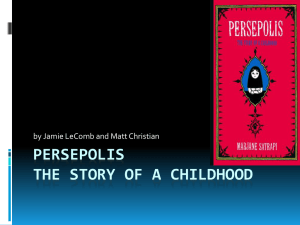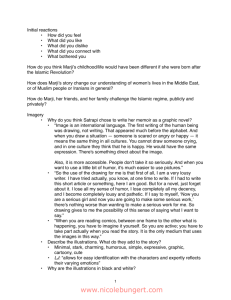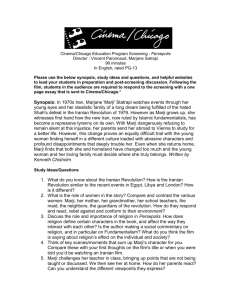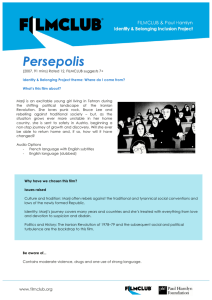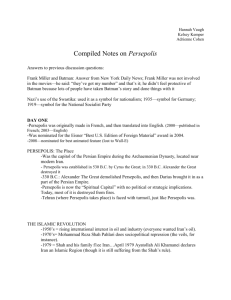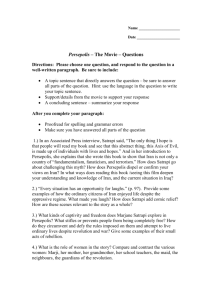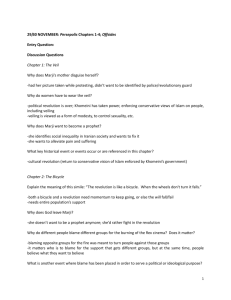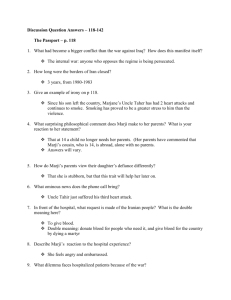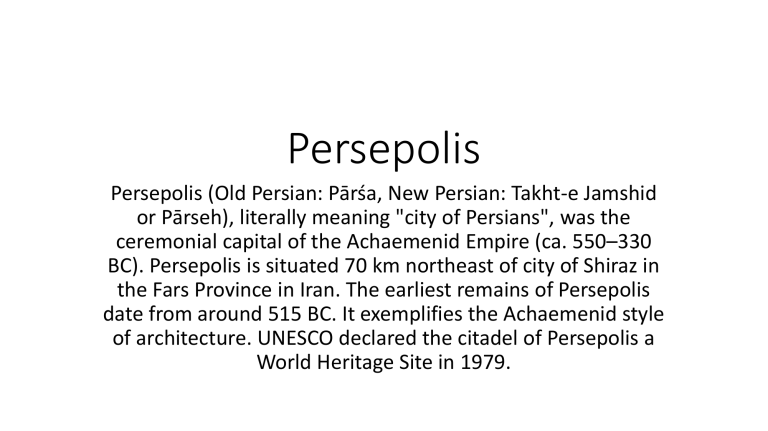
Persepolis Persepolis (Old Persian: Pārśa, New Persian: Takht-e Jamshid or Pārseh), literally meaning "city of Persians", was the ceremonial capital of the Achaemenid Empire (ca. 550–330 BC). Persepolis is situated 70 km northeast of city of Shiraz in the Fars Province in Iran. The earliest remains of Persepolis date from around 515 BC. It exemplifies the Achaemenid style of architecture. UNESCO declared the citadel of Persepolis a World Heritage Site in 1979. capitalism an economic and political system in which property, business, and industry are owned by private individuals and not by the state. socialism (or Marxism) Socialism is a set of political principles whose general aim is to create a system in which everyone has an equal opportunity to benefit from a country's wealth. Under socialism, the country's main industries are usually owned by the state. dialectical materialism he economic, political, and philosophical system of Karl Marx and Friedrich Engels that combines traditional materialism and Hegelian dialectic totalitarianism is the ideas, principles, and practices of totalitarian political systems. the Shah (formerly, in Iran) king; sovereign. There were two, the original Shah’s son was overthrown in the 1979 Islamic Revolution. Islamic Revolution Iran 1979 – a state of revolt when the Iranian Shah was overthrown and an Islamic theocracy was put in place. 1.According to the introduction, what stereotypical image is Satrapi trying to dispel? Iran has been discussed mostly in connection with fundamentalism, fanaticism and terrorism. 2.The author indicates two motives for writing Persepolis What are they? 1. the entire nation should not be judged by the wrongdoings of a few extremists. 2. those Iranians who defend freedom, die in the Iraq war, leave their home should not be forgtten. “The Veil” 1.How was education affected by the new regime? Why? Answer: all the female students have to wear veil in school and all the bilingual schools are forced to close. students are separated from their friends. because this is called a cultural revolution. 2.What did bilingual schools represent to the new regime? Answer: the bilingual schools symbol of capitalism 3.How do women respond to the veil? Answer: women walk on the streets to demonstrate either support or against the veil. 4.Why was a picture of Marjane’s mother published in the newspaper? How did her mother respond? Why? Answer: 1.she was protesting the veil when a German journalist took a photo of her. 2.she was really scared and dyed her hair, worn dark glasses for a long time. 3.against wearing veil means against the regime so she is afraid of being found 5.Why does Marji want to be a prophet? (3 reasons) Answer: 1.her maid did not eat with her family. 2.her father had a Cadillac 3.her grandmother's knee always ached 6.Who is Zarathustra, and what are his three rules for living? Answer: 1.he is the first prophet in the country before the Arab invasion. 2.behave well; speak well; act well. 7.How do others respond to Marji’s religious calling? Answer: 1.they just laugh and consider her as crazy and disturbed. “The Bicycle” 1.Who are Che Guevara, Fidel, and Trotsky? (Look them up!) Why are they important? 3.What happens at the Rex Cinema? What does the Shah say? What do Marjane’s parents know? Answer: 1.it is burnt down with 400 victims killed. 2.Shah said it was done by a group of religious fanatics. 3.they know it was Shah's fault and there will be more demonstrations later on. “The Water Cell” 1.According to Marji, how was a king chosen? What was her rationale? Answer: 1.the king was chosen by God 2.the knowledge she learnt from book and words from teachers 2.Why did Marji’s parents react to her statement about the Shah (hint: her family history)? Answer: Shah's father has overthrown the former emperor, who is the grandpa's father of Marji 3.What was Marji’s grandfather’s job under Reza? How did his beliefs change, and how did his life change? Answer: 1.prime minister 2.he went to Europe for study and had access to read Marx and became a communist. 3.he was often sent to prison and his life was in pain. 4.Why does God return after a long absence? Answer: it reflects the controversy inside Marji's mind, she used to believe in God and he has chosen the Shah but in fact it was not, Shah put her grandpa into jail and ruined his life. 4.Why does God return after a long absence? Answer: she lost her faith and needed help and advice from others. “Persepolis” 1.How did the new Shah’s rule compare to his father’s? Answer: the new Shah is ten times tougher than his father 2.Describe the symbolism of the image at the top of page 28 Answer: It symbolizes how their actions seem great (praying) but really are not so good (disrespect the dead.) 3.What did Marji’s father do every day that makes her mother so nervous? Why is this activity strictly forbidden? Answer: 1.taking photos of the demonstration 2.the authority does not expect the suppression to be reported 4.What did Marji’s father do every day that makes her mother so nervous? Why is this activity strictly forbidden? Answer: 1.taking photos of the demonstration 2.the authority does not expect the suppression to be reported “The Letter” 1.What causes Marji to feel so ashamed? Why? Answer: 1.her friends did a lot of work in a young age but she did not 2.she can feel the huge difference between social classes 2.How does Marji view Mehri? How does Mehri view Marji? Answer: 1.Marji considers her as a family member with no class difference. 2.Mehri views Marji as her sister 3.What did Marji do for six months to help Mehri? Why? Answer: 1.Marji wrote letters for Mehri. 2.Mehri cannot read or write 4.What is the outcome when the news of Mehri’s clandestine affair reaches Marji’s father? Why did it end up that way? Answer: 1.he meets Hossein to clarify the situation. 2.Hossein believes that they belong to different classes so they will not become couple. 5.What is Marji’s reaction to the break-up? Answer: she is so confused but can do nothing to change the reality. the only thing she can do is to comfort Mehri 6.What happened on Black Friday? Why? What painful lesson did Marji learn? Answer: 1.Marji and Mehri go to the street to protest and are caught by her parents then get slapped on the face. 2.it is very dangerous that day because many people are killed in one of the neighbourhoods. 3.it is the Iranian people killed each other rather than Israeli “The Party” 1.How does the Shah attempt to appease the people? Why did he fail? Answer: 1.he declares the march towards democracy and tests a dozen prime ministers 2.he doesn't really mean to carry on democracy so nobody trusts him 2.How had the U.S. changed its public policy toward Iran? Answer: although Jimmy Carter and Shah were friends before but Jimmy refused to give refuge to Shah and his family. because the US cannot get oil from him. 3.According to Marji’s dad, why will the Middle East never have peace? What do you think? Answer: 1.there is oil in the middle east 4.What contributes to Marji’s anger and confusion when she returns to school? Answer: 1.the teacher asks students to tear out the photos of the Shah from their books. 2.she is told that Ramin's father has killed a million people 5.What two lessons does Marji learn from her mother? Answer: 1. she should not nail people. 2. she should learn to forgive someone. “The Heroes” 1.Where had Siamak and Mohsen been for the last several years? Why? Answer: 1. they were locked in the prison 2.they fight against the Shah regime 2.Who led the training in torture practices? Answer: scientists from CIA 3.According to Marji, what makes a hero? Answer: fighting for the good and freedom for the country is a hero, who can also bear torture. “Moscow” “Moscow” 1.Who is Anoosh? How does Marji feel about him? Why? Answer: 1.Marji's uncle, a brother of Marji's father 2.he is a real hero for Marji and she is very proud of him. 3. he fights against Shah and is put in prison for nine years. 2.Who is Fereydoon? What was his goal? Answer: 1.Anoosh's uncle 2.to free Iran province by province “Moscow” 3.Where did Anoosh go after Fereydoon’s arrest? How would you characterize him? Answer: 1.he went to his parents' home 2. 4.When he had to leave, where did he go? Answer: he went to the U.S.S.R when he got better in his parents' home 5.What does Anoosh study in the USSR? Answer: Marxism-Leninism 6.What gift does Anoosh give to Marji? What might it symbolize? Answer: 1.a swan made from bread 2.his ability to maintain his humanity in dreadful situations “the Sheep” 1.What is the significance of the title? How does it help to characterize the people of Iran? Answer: 1. Their family friends had made across the border by hiding in a flock of sheep 2. usually when there's a flock of sheep there's usually a shepherd controlling them, like how the government is controlling its people 2.According to Anoosh, why is it nearly impossible to persuade the population to follow Marxism? Answer: 1. half of the population is illiterate 2. the religious leaders will still govern the country by religious ethic. 3.What was the reported outcome of the elections? How does Marji’s father explain these results? Answer: 1. 99.99% of the population voted for the islamic republic 2.these results are faked 4.Why do Marji’s parents subject themselves to a political upheaval and refuse to leave Iran? What is their opinion of those who left? Answer: 1. they do not want to live in a poor life because Marji's father says he can only be a taxi driver and her mother can only be a cleaning lady. 2.they are just afraid of change and they will come back home finally. 5.What makes Marji suspect that something has happened to Anoosh? Answer: Anoosh did not pick her up after school 6.What is Anoosh’s final wish? Why? Answer: the proletariat will rule 7.Who comes to visit Marji after Anoosh’s death? What is Marji’s reaction? Answer: 1. the God 2. she is very angry with the God and asks him to get out. “the trip” 1.What do the fundamentalist students do? How does this event affect Marji’s plans? Answer: 1. they have taken the Americans hostage. 2. the US embassy is closed so Marji cannot go to the US to see her friend Kaveh. 2.Why does the new regime close the universities? Answer: the educational system and what is written in school books are decadent,everything needs to be revised to ensure that our children are not led astray from the true path of Islam. to avoid students from being affected by the imperialism 3.What event causes Marji’s mom to take to her bed for several days? Answer: two fundmentalists insulted her because she did not wear veil. 4.What does the illustration on pg. 77 reveal about Marji’s feelings about the vacation? Answer: she is quite happy and enjoying the vacation very much. 5.What does Saddam Hussein do at the end of this chapter? Why? Answer: 1.he invaded Iran and started a war. 2.he has been wanting to invade Iran for a long time and some fundamentalists just offered him the chance 6.How does Marji feel about the new war? Answer: she feels very excited and wants to fight against Iraq. “The F-14’s” 1.Does Marji’s father intend to fight against the Iraqis? Why? Answer: no. he is more against the regime in domestic Iran than Iraqis. 2.What is humorous about the sequence at the bottom of pg 81? Answer: showing that Taji is completely oblivious of the bomb, indicating the war is a surprise 3.How does Marji reflect the common stereotypical thinking of other Iranians? How does Marji’s dad cut through her propaganda induced thinking? Answer: 1. the Iranians should retaliate and bomb Baghdad 2.the pilots are either imprisoned or executed 4.What does Pardisse describe in her paper? How does Marji try to console her friend? What is Pardisse’s response? What does Marji learn from this experience? Answer: 1. a letter to her father in which she promised to take care of her mother and little brother. 2.by telling her that her father is a hero and she should be proud of him. 3.she wishes that his father were alive in prison rather than dead 4.being alive is always important than anything “The Jewels” 1.What is one of the ramifications of the nation’s political conflict? Answer: resources are very low 2.What criticism does Marji’s mom make of capitalism? What confusing thing does she suggest as they leave the store? Answer: 1.people who follow capitalism are always greedy. if everyone took only what they needed, there would be enough to go around. 2.she has got two boxes of rice but would like to get more, which makes Marji feel confused 3.Describe the symbolism in the picture at the bottom of page 89. Answer: It symbolizes the people trying to escape the fire from the bombs. 4.Besides their possessions, what else have refugee families lost? Answer: their homes and houses 5.Besides their possessions, what else have refugee families lost? Answer: their homes and houses “The key” 1.What was the primary difference between the Iranian and Iraqi armies? Answer: Iraqi armies were modern with good quality while Iranian armies had a huge reservoir of potential soldiers 2.What might be the purpose of publishing Iran’s “martyrs”? Answer: the government wants people to be angry and willing to join the army to the war 3.Comment on the picture on page 95. Answer: students are forced to join the mourning activity and beat their breasts whereas they are actually confused and unwilling about it rather than angry or sympathetic for the lost lives of the soldiers 4.Why was Marji’s generation so rebellious? What does the teacher blame? Answer: 1.Marji's generation was so rebellious because prior to now they had been to combined schools and were allowed an education with worldly ideas. 2.The teacher blames the basis education comes from the family. 5.What injustices do the parents see in the educational system? Which restriction is particularly ironic? Answer: 1.their children have to hit themselves, be covered from head to toe and forbidden to play. 2.The fact that women had to cover themselves and men did not was ironic. 6.Who does the government recruit to serve on the front lines of the war? How do they persuade them? Can you think of another time when this practice has been used? Answer: 1.young boys 2.the government says if they are dead in the war, they will be taken by the key to the paradise where they can get food, women and houses. “The wine” 1.How did the interior of their homes reflect the external changes that were occurring? What two things did they need to protect themselves against? Answer: 1.Iraqi planes and Iranian fundamentalists are everywhere. 2.protect themselves from bombing and neighbours 2.What forbidden items did the government find at the house of Timoosh’s dad? What was his punishment? When have you seen this in our country? Answer: 1.records, video cassettes, chess set and cards 2. 75 lashes 3.Why did Marji’s family continue to hold parties despite the danger? Answer: Because they felt that life would be unbearable without parties. 4. Even though Mrs Nassrin’s comments on page 106 bring humor, how are her actions also symbolic? Answer: This symbolize the Iranian revolution. They are stomping on the people. Or the people are being made to do things that go against their personal beliefs like Mrs. Nassrin has to do. 5. Name one violation that Marji’s dad is guilty of at the traffic stop. How does his wife respond to the situation? What is a condition of their release? Answer: 1.driving after drinking alcohol or wrong dressing code 2.try to beg for the officer's forgiveness 3.for the guy to follow them home and search their home. 6. What story does Marji’s grandmother use to stall the officers? What is she really planning to do? Ultimately, how did they get rid of the officer? Answer: 1.she has diabetes 2.flush all the alcohol in the house down the toilet 3.Marji's dad just ends up bribing him to leave “The cigarette” 1. What did the local news report about the war? What does Marji realize about this information? Answer: 1.The news reports are exaggerated, and they reported that they had destroyed 10 Iraqi planes and 5 tanks every day. 2. it is faked because even America doesn't have such a big army. 2. What was Marji’s motive for breaking her parents’ rules? Answer: She broke the rules because she wanted to fit in and be friends with the 14 year olds. 3. What was Marji’s destination? What was its reputation? How do you think it was able to survive the regime’s repression? Answer: 1.Her destination was Kansas on Jordan avenue. 2.Kansas had a reputation of teenagers from north Tehran hanging out there; it was a "hip" place. 3.It was able to survive because the regime had no idea that Kansas was a place where you could have some fun. 4. How would you describe the relationship between Marji and her mother? Answer: Marji and her mom have a tense relationship at this point. 5. Describe the efforts made toward bringing an end to the war between Iran and Iraq. Answer: Iraq proposed a settlement to rebuild Iran and to restore peace that Saudi Arabia was going to fund 6. What was the motivation for launching an attack on Karbala? Answer: Iran did not want peace they wanted to continue the war. 7. What did the survival of the regime depend upon? What was the human cost of this survival? Answer: 1.The survival of the regime depended on the war. 2.The human cost was one million people. 8. How did the regime become more repressive? Answer: The regime became more repressive naturally by systematically arresting and executing their own people who opposed it. 9. What was Marji’s symbolic act of rebellion? Describe her interesting response. Answer: 1.Marji's symbolic act of rebellion was her smoking a stolen cigarette; 2.her response was she thought it was awful but she still continued. 10. In what ways has Marji become an adult? Answer: 1.Marji believes rebelling against her parents and becoming more independent is making her more of an adult. “The PASSPORT” 1. What had become a bigger conflict than the war against Iraq? How does this manifest itself? Answer: 1.anyone showing the slightest resistance to the regime was persecuted. 2.the butcher said kids were executed in the street without even having been judged 2. How long were the borders of Iran closed? Answer: three years from 1980 to 1983 3. What surprising philosophical comment does Marji make to her parents? What is your reaction to her statement? (see page 119) Answer: 1.Marji says that she doesn't need parents in her life. 4. In front of the hospital, what request is made of the Iranian people? What is the double meaning here? Answer: 1.people's blood is requested to be donated to save the wounded in the war. 2. the government asks people to be a martyr like injecting blood into the society but now they ask for blood from alive people 5. People in need of hospital care face a dilemma: describe this problem. Answer: The hospital didn't have the equipment for people needing open heart surgery, and it is difficult to get a passport to get medical care outside the country. 6. How did the government delegate positions of power? Describe the encounter between Marji’s aunt and the Minister of Health. Answer: 1.Positions of power are given to anyone who fully adopts the beliefs of the regime. 2.The Minister of Health was Marji’s aunt’s former window washer. All he had to do to get a position of authority was growing a beard and putting on a suit. 7. Where did many of the seriously wounded travel for treatment? Why is this ironic? Answer: 1.They traveled to Germany 2.it is ironic because Germany sold the weapons to Iran that caused all these injuries. 8. What is Taher’s only wish? What prevents him form realizing his dream? Ironically what happens three weeks later? Answer: 1.To see his son again before he dies. 2. Niloufar is spotted, identified as a communist and executed. 3. Three weeks later, uncle Taher's real passport arrives on the same day he is buried. “KIM WILDE” 1.When did Marji’s parents receive their passports? What was one provision listed? Answer: 1.A year after the death of Marji's uncle 2. Strictly forbidden to travel in occupied Palestine. 2.What problem do Marji’s parents face as they return from their trip to Istanbul? How does Marji’s mom show her ingenuity? Answer: 1.Her parents are bringing illegal items back into Iran: Kim Wilde and Iron Maiden posters. 2.Her mother sews them into the dad’s coat 3.How does Marji’s reaction to the Kim Wilde poster reinforce an existing conflict? Answer: She originally said Turkey is uncool. Now that the posters and other illegal items have come from Turkey, she says she loves Turkey. 4.How did Marji’s mother compare to other Iranian mothers? How does Marji’s relationship with her mother seem to reflect typical parent-child issues? Answer: 1.Her mother was more permissive than most mothers, allowing her 13-year-old daughter to go out alone 5.How had Iran’s food shortage been resolved? What was appealing about Gandhi Avenue? Answer: 1.it is solved by the growth of the black market. 2.you can buy forbidden items from the Gandhi Avenue such as tapes 6.What was the purpose of the Guardians of the Revolution? What happens when they encounter Marji? How does Marji respond? Answer: 1.to arrest women who were improperly veiled 2.They are critical of Marji, saying that she is not properly dressed, her head not properly covered. 3.she lies and makes up many excuses 7.Why will Marji have to go to the Committee? What would happen there? How does Marji avoid going before the Committee? Answer: 1.she wears punk shoes, jacket, with Michael Jackson button, tight jeans and veil incorrectly 2.Marji could be held for hours withno notification to her parents. She could be whipped 3.she lies and makes up many excuses(her mum is dead and the stepmother is cruel) 8.Analyze Marji’s behavior when she returns home. Answer: 1.She doesn’t want to tell hermother because she knows her mother will never again let her out alone. 2.She just goes up to her room and listens to the tapes that she got away with. 8.Analyze Marji’s behavior when she returns home. Answer: 1.She doesn’t want to tell hermother because she knows her mother will never again let her out alone. 2.She just goes up to her room and listens to the tapes that she got away with. “the Shabbat” 1.What was the new strategy? How does the author characterize Iranians? How does she characterize her father? Her mother? Answer: 1.the Iraq is using ballistic missiles 2.the Iranians like to make exaggerating gossip 3. Her father is optimistic. He can see something happen but will only believe it when the BBC confirms it. 4.Her mom is more pessimistic. 2.What did the sirens signify? What did Marji realize for the first time? Answer: 1.Sirens mean they have three minutes to know if the end had come 2.She realized how much danger they were in, that it didn’t matter if they went to the basement or not, they would be killed if a missile was dropped on their building. 3.How does the picture on the top of page 137 reflect the mood? Where does Marji’s only hope lie? Answer: 1.The city is deserted. It is a large picture of trees and an empty street. 2.Marji’s only hope, in her parents’ eyes, lies in a French education that she can get only in Teheran. 4.What motivated the Baba-Levy family to stay in Iran? Why is this so unusual? What was Neda’s dream? What ultimately happens to her and her family? Answer: 1.The Baba-Levy family is Jewish, and they said their ancestors had come 3,000 years ago and this was their home so they were staying. 2.There are few Jewish people in Iran. 3.The daughter Neda romanticizes about a blond-hair, blue-eyed prince saving her. 4. A bomb hits their building, and they are killed. 5.What happened to Iran’s economy during the war? Is this unusual? Answer: 1.The currency (tuman) loses its value and the inflation becomes very serious. 2.no, it is usual. 6.How does Marji’s mother attempt to protect her daughter? How does Marji discover the truth? What does the last frame on page 142 reflect? Answer: 1.she tries to change the subject by talking about the tape on the windows and pull me away from the destroyed building. 2.she saw a bracelet on the debris, which was attached to a certain body part. 3. It reflects Marji's deepest suffering and anger.
